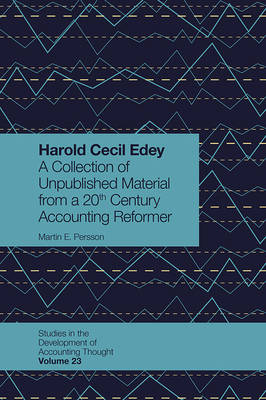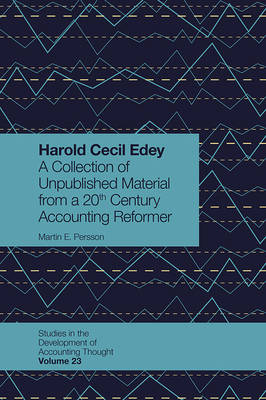
- Afhalen na 1 uur in een winkel met voorraad
- Gratis thuislevering in België vanaf € 30
- Ruim aanbod met 7 miljoen producten
- Afhalen na 1 uur in een winkel met voorraad
- Gratis thuislevering in België vanaf € 30
- Ruim aanbod met 7 miljoen producten
Zoeken
Harold Cecil Edey
A Collection of Unpublished Material from a 20th Century Accounting Reformer
€ 180,45
+ 360 punten
Omschrijving
Harold Cecil Edey (1913-2007) and his colleagues David Solomons (1912-1995) and William T. Baxter (1907-2006) at the London School of Economics and Political Science (LSE) were instrumental in the development of British accounting thought in the mid-1900s. These three influential scholars influenced a generation of students who came to populate the British accounting profession and academia to the point where, in the early 1970s, half of all full-time accounting professors in the United Kingdom were LSE alumni. Edey's role in these developments, however, remains relatively underappreciated.
This edited volume contains 13 of Edey's unpublished manuscripts written during the heyday of the LSE Triumvirate. These manuscripts address issues of accounting education, measurements, and theory, and they are accompanied by editorial comments that put the material in its historical context. The volume also contains an aide-mémoire of Edey's professional activities and a complete bibliography of his published work. The material offers new insight into Edey's contribution to the British accounting profession, and developments at the LSE, during a critical period of academic expansion and struggle to address the problem of accounting for rising inflation. The material is of value to anyone interested in the development of accounting thought.
This edited volume contains 13 of Edey's unpublished manuscripts written during the heyday of the LSE Triumvirate. These manuscripts address issues of accounting education, measurements, and theory, and they are accompanied by editorial comments that put the material in its historical context. The volume also contains an aide-mémoire of Edey's professional activities and a complete bibliography of his published work. The material offers new insight into Edey's contribution to the British accounting profession, and developments at the LSE, during a critical period of academic expansion and struggle to address the problem of accounting for rising inflation. The material is of value to anyone interested in the development of accounting thought.
Specificaties
Betrokkenen
- Uitgeverij:
Inhoud
- Aantal bladzijden:
- 168
- Taal:
- Engels
- Reeks:
- Reeksnummer:
- nr. 23
Eigenschappen
- Productcode (EAN):
- 9781789736700
- Verschijningsdatum:
- 30/09/2019
- Uitvoering:
- Hardcover
- Formaat:
- Genaaid
- Afmetingen:
- 150 mm x 231 mm
- Gewicht:
- 317 g

Alleen bij Standaard Boekhandel
+ 360 punten op je klantenkaart van Standaard Boekhandel
Beoordelingen
We publiceren alleen reviews die voldoen aan de voorwaarden voor reviews. Bekijk onze voorwaarden voor reviews.







